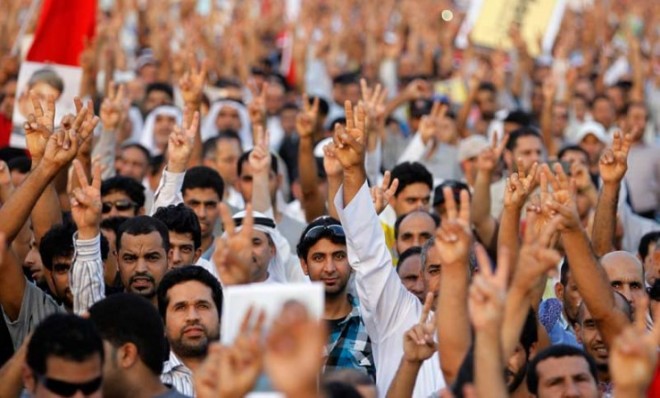5 countries where freedom is dying
Sadly, democracy is on the decline in several African nations

A free daily email with the biggest news stories of the day – and the best features from TheWeek.com
You are now subscribed
Your newsletter sign-up was successful
Which countries have seen the biggest declines in political and civil rights over the last several years? Pro-democracy watchdog Freedom House has the answers in its latest Freedom in the World rankings. Freedom House rates each country on a scale of 0 to 100, with 40 points devoted to political rights and 60 to civil liberties. Four of the five biggest declines in that score over the last five years have come from African nations. Here, the five worst performers:
Bahrain
Last year, Kim Kardashian irked human rights activists by tweeting "I'm in love with The Kingdom of Bahrain" while visiting the country to promote a franchise called Millions of Milkshakes. Why the anger? The ruling Al Khalifa family has been especially harsh in handing down lengthy prison sentences to opposition activists. Earlier this month, Bahrain's highest court upheld a ruling that condemned 20 activists to prison, including eight life sentences. Activists abroad are still trying to free Nabeel Rajab, the head of the Bahrain Centre for Human Rights, who according to the BBC was jailed for encouraging "illegal gatherings."
The Week
Escape your echo chamber. Get the facts behind the news, plus analysis from multiple perspectives.

Sign up for The Week's Free Newsletters
From our morning news briefing to a weekly Good News Newsletter, get the best of The Week delivered directly to your inbox.
From our morning news briefing to a weekly Good News Newsletter, get the best of The Week delivered directly to your inbox.
Guinea-Bissau
This West African country moved from the classification "Partly Free" to "Not Free" thanks to what The New York Times called the "cocaine coup," an uprising by the military that, months before a presidential runoff election, turned the country into perhaps the biggest center for drug trafficking in Africa. Since then, the national legislature has been suspended and opposition parties have been harassed. Amnesty International warned that the severe beatings of two government critics in October would only add to the "rapid deterioration of the human rights situation in the country and the pervasive climate of fear."
Gambia
In August, Gambian President Yahya Jammeh executed nine prisoners without warning and declared that his government would kill all of the country's remaining death row inmates by September, setting off a firestorm of criticism from the international community. Jammeh, who gained power in a 1994 coup, later halted the executions amid growing pressure. Still, the prisoners (many of whom are reportedly political) aren't completely out of the woods. According to Al Jazeera, Jammeh claimed that he would resume the executions if the country experienced an "increase in violent crime."
A free daily email with the biggest news stories of the day – and the best features from TheWeek.com
Madagascar
Political and economic instability still plague Madagascar years after former disc jockey Andry Rajoelina led a military-supported coup against then-President Marc Ravalomanana in 2009. According to Freedom House, the country's problems, including "intimidation of journalists, violence in the south, and a rise in human trafficking," have only gotten worse. While Rajoelina's recent announcement that he was "ready to make a democratic transition" by not running in the May presidential elections is a positive sign, observers fear what might happen if the exiled Ravalomanana tries to rally his supporters.
Mali
The most precipitous decline in the history of the Freedom in the World report belongs to Mali. The country started 2012 with a rating of "Free" before a rebellion by ethnic Tuaregs set the stage for a military uprising, which led to the overthrow of democratically elected President Amadou Toumani Toure. Soon al-Qaeda-linked rebels claimed the north, causing some African officials to dub the region the "Afghanistan of West Africa." This month, French armed forces entered Mali to stop the march of rebels toward the capital, creating fears of a military quagmire that could have serious repercussions for neighboring countries, Europe, and the United States. The worst-case scenario, according to NPR's Dina Temple-Raston, is that France's intervention attracts terrorists from other countries, turning what was a local conflict into a "global terrorism problem."
Keith Wagstaff is a staff writer at TheWeek.com covering politics and current events. He has previously written for such publications as TIME, Details, VICE, and the Village Voice.
-
 Political cartoons for February 21
Political cartoons for February 21Cartoons Saturday’s political cartoons include consequences, secrets, and more
-
 Crisis in Cuba: a ‘golden opportunity’ for Washington?
Crisis in Cuba: a ‘golden opportunity’ for Washington?Talking Point The Trump administration is applying the pressure, and with Latin America swinging to the right, Havana is becoming more ‘politically isolated’
-
 5 thoroughly redacted cartoons about Pam Bondi protecting predators
5 thoroughly redacted cartoons about Pam Bondi protecting predatorsCartoons Artists take on the real victim, types of protection, and more